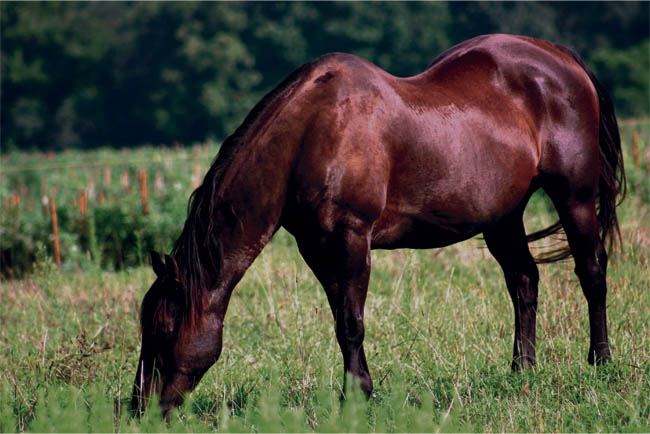
Jaguar Animal Health and Napo Pharmaceuticals have teamed up to study NP-500 in hopes of developing a medication to treat and manage equine insulin-resistance. Clinical studies are expected to begin in 2016.
An animal health company intends to begin clinical studies in 2016 of a North American plant derivative that’s used in traditional human medication in hopes of treating and managing equine insulin-resistance, which can lead to laminitis.
San Francisco, Calif.-based Jaguar Animal Health Inc. announced Monday that the U.S. Patent and Trademark Office issued two Notices of Allowance pending patent applications for NP-500 and its use.
NP-500 is the active pharmaceutical ingredient in potential insulin-resistance drug products that are being developed by Jaguar.
Originally obtained from a North American plant, NP-500 has been through Phase 2 human clinical testing by third parties. While it has used to treat Type II diabetes and other various illnesses in humans, it has demonstrated an effectiveness for animals as well. Studies in animals have shown an increase in insulin sensitivity, reduced blood glucose levels, reduced serum free fatty acids and triglycerides, as well as a potential benefit for blood pressure.
“We remain committed to leveraging our broad intellectual property portfolio and robust pipeline of products that have extensive safety and disease model testing in both animals and man to identify opportunities to develop species-specific, first-in-class products for markets that can be readily accessed and have treatment gaps,” says Lisa Conte, Jaguar’s president and CEO. “Insulin resistance and clinical manifestations of such are a significant problem in dogs, horses and cats, and we plan to initiate clinical studies for NP-500 in 2016 and beyond.”
Insulin-resistance in horses is associated with an equine metabolic syndrome that is characterized by obesity, regional adiposity and hypertriglyceridemia. It’s also a risk factor for laminitis. A number of studies have found that the prevalence of insulin resistance in horses is 10% and 28% in ponies.
There are no FDA-approved products for treating metabolic syndrome in horses or ponies.
Jaguar filed an investigational new drug application in March 2014 for NP-500 for metabolic syndrome in horses. The pending patent applications were submitted by San Francisco-based Napo Pharmaceuticals Inc., which issued an exclusive license to Jaguar for all veterinary treatment uses and indications for animals.







